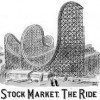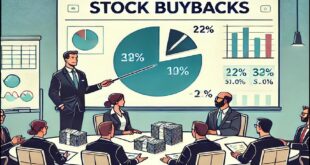If you aren’t certain that you understand and can value your business far better than Mr. Market, you don’t belong in the game. As they say in poker, “If you’ve been in the game 30 minutes and you don’t know who the patsy is, you’re the patsy.”
Mr. Market, you don’t belong in the game. As they say in poker, “If you’ve been in the game 30 minutes and you don’t know who the patsy is, you’re the patsy.”
So wrote Warren Buffett in relating the classic analysis of “Mr. Market” by his mentor, Benjamin Graham, as included in the Berkshire Hathaway’s 1987 Annual Report.
[The following copy is presented by Lorimer Wilson, editor of www.munKNEE.com and the FREE Market Intelligence Report newsletter (sample here). This paragraph must be included in any re-posting to avoid copyright infringement.]
Below is the complete analysis:
“Ben Graham, my friend and teacher, long ago described the mental attitude toward market fluctuations that I believe to be most conducive to investment success.
He said that you should imagine market quotations as coming from a remarkably accommodating fellow named Mr. Market who is your partner in a private business. Without fail, Mr. Market appears daily and names a price at which he will either buy your interest or sell you his.
Even though the business that the two of you own may have economic characteristics that are stable, Mr. Market’s quotations will be anything but. For, sad to say, the poor fellow has incurable emotional problems. At times he feels euphoric and can see only favourable factors affecting the business. When in that mood, he names a very high buy-sell price because he fears that you will snap up his interest and rob him of imminent gains. At other times he is depressed and can see nothing but trouble ahead for both the business and the world. On these occasions he will name a very low price, since he is terrified that you will unload your interest on him.
Like Cinderella at the ball, you must heed one warning, or everything will turn into pumpkins and mice: Mr. Market is there to serve you, not to guide you. It is his pocketbook, not his wisdom, that you will find useful. If he shows up some day in a particularly foolish mood, you are free to ignore him or to take advantage of him, but it will be disastrous if you fall under his influence.
Indeed, if you aren’t certain that you understand and can value your business far better than Mr. Market, you don’t belong in the game. As they say in poker, “If you’ve been in the game 30 minutes and you don’t know who the patsy is, you’re the patsy.”
When excessive optimism prevails in the market, investors often drive up the price of a stock beyond its intrinsic value and, conversely, when excessive pessimism prevails, the very same investor drives down the price much below the intrinsic value.
Mr. Buffett has urged investors to take advantage of these idiosyncrasies so that attractive returns can be generated over one’s investment lifetime. Mr. Buffett’s own success can be attributed to taking advantage of the same idiosyncrasies.
The next time the stock price of a company crashes, don’t forget to ask ‘Is the fall justified or is Mr. Market being overly pessimistic today?’
 munKNEE.com Your Key to Making Money
munKNEE.com Your Key to Making Money


